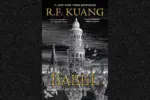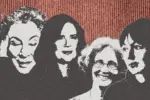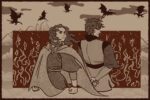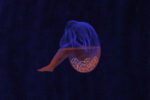In the last few years, with the rise of TikTok and Instagram aesthetics, the term “dark academia” has entered the social media lexicon and seems to be here to stay. For anyone who’s not on these platforms, it’s a phrase that conjures images of dark wood, old books, tweed blazers and flowing wool coats. Staying up till dawn poring over classic texts, with candles as your only source of light; writing handwritten letters under the moonlight; passionately quoting poetry to your friends — it’s this imagery that defines dark academia.
In many ways, the internet subculture is a way for chronically online students to rebel against the digitalization of their education and their everyday lives. It’s also a way for students to cling onto the humanities, particularly to history, literature and languages, despite the long-standing threat posed to these fields by economic issues. Yet, even as I’ve indulged in this growing online community and, as an English major, sympathized with its romantic ideals, I’ve always been wary of it at the same time, seeing as it requires engagement with social media to survive. Because of my own conflicted stance, I try not to use the term or align myself with the aesthetic too much.
I only discovered the term “campus novel” (or “academic novel”) a few years ago, and, of course, by scrolling through online posts about dark academia. This is less of an abstract aesthetic and more of an actual subgenre, one with a history that goes back to the 1950s. One of the “classic” examples of the genre is John Knowles’ 1959 novel, “A Separate Peace,” which is also classified as a coming-of-age story. This is one of those books that your parents probably had to read for high school, and as you might expect, it’s pretty dry.
Another famous campus novel, “The Secret History” by Donna Tartt, is one that’s pretty familiar to nearly everyone who knows about dark academia. It’s more of a modern classic and definitely a personal favorite of mine that never disappoints. But even though it’s a great novel, it’s also extremely popular and has become the quintessential campus novel for contemporary readers, so much so that it doesn’t really need to be recommended.
Not every student will see the appeal of reading a book about college while in college, and that’s completely understandable. Why spend your all-too-rare free time reading about people struggling with deadlines, studying in the library late at night and mingling awkwardly at parties — in other words, people going through the same motions you are? It’s a valid question. But for certain kinds of readers, processing college life through a novel can be surprisingly cathartic.
Losing myself in the pages of a thrilling story while also finding little things I can relate to is one thing I love about reading campus novels on my actual campus. There are a whole lot of books to choose from within the growing subgenre, but here are just a few that might appeal to college students getting back into school mode.
1. “If We Were Villains” by M.L. Rio
M.L. Rio’s 2017 campus novel, “If We Were Villains,” is, first and foremost, an exciting page-turner with a cast of interesting characters, but it’s also the first book I would recommend to anyone who loves “The Secret History” and might be looking for something similar. The story follows a group of college-age students at a fictional performing arts conservatory that specializes in Shakespearean theater. The students are in their final year at the conservatory and have all become quite close. But as the year progresses, tensions begin to rise within the group, leading to a loss that proves to have far-reaching consequences for each of the characters.
For anyone who has read “The Secret History,” the similarities might already be obvious, but this shouldn’t deter you from giving “If We Were Villains” a shot. Along with a fast-moving plot, the novel features a number of complex relationships, the most significant of which is between Oliver, the main character and narrator, and his best friend, James. Unspoken desires, competitive streaks and a passionate love of Shakespeare all lie at the center of this story and will appeal to anyone who enjoys subtle twists and darker themes in the novels they read.
2. “Bunny” by Mona Awad
Out of the three books on this list, Mona Awad’s debut novel, “Bunny,” is without a doubt the hardest to describe. Blending elements of horror and magical realism into the traditional campus novel, “Bunny” follows Samantha, an MFA student at a prestigious university in New England who takes refuge in the powers of her own imagination. Though she is a dedicated writer, she also happens to resent the other students in her program, a group of girls with extremely mannered behaviors, vapid personalities and a tendency to move together as one.
Because they refer to each other as Bunny (why they do this is never explained, but meant to be taken as it is), Samantha calls the group the Bunnies. Her year with them is off to an average start, until the Bunnies invite her to one of their meetings — and things start to get truly, exceptionally weird. If you’re comfortable with reading a story that does not at all aim to make sense and in fact just gets stranger and stranger, then “Bunny” would make for an entertaining and thought-provoking reading experience.
3. “These Violent Delights” by Micah Nemerever
Slow-paced yet thrumming with a quiet passion, Micah Nemerever’s debut novel, “These Violent Delights,” follows a twisted relationship between two students in 1970s Pittsburgh. Paul, an achingly shy artist who suffers from intense insecurities, is drawn to the rich, outspoken Julian almost immediately. The two quickly develop a friendship built on their own fierce intellects and a deep-rooted intimacy that Paul will do anything to protect.
Even as Julian’s behavior grows increasingly erratic and even cruel, Paul finds he is unable to pull away from Julian’s influence. Soon, their relationship spirals out of control and transforms into something that neither man could have imagined. Like “If We Were Villains” and “Bunny,” “These Violent Delights” is a dark, moody (one might even say broody) and reflective novel. It centers around the extreme, volatile feelings of its protagonists, not on action or exciting sequences. But in terms of emotional impact, this is a story that will cut to the bone and stay with you for longer than you might expect.

















